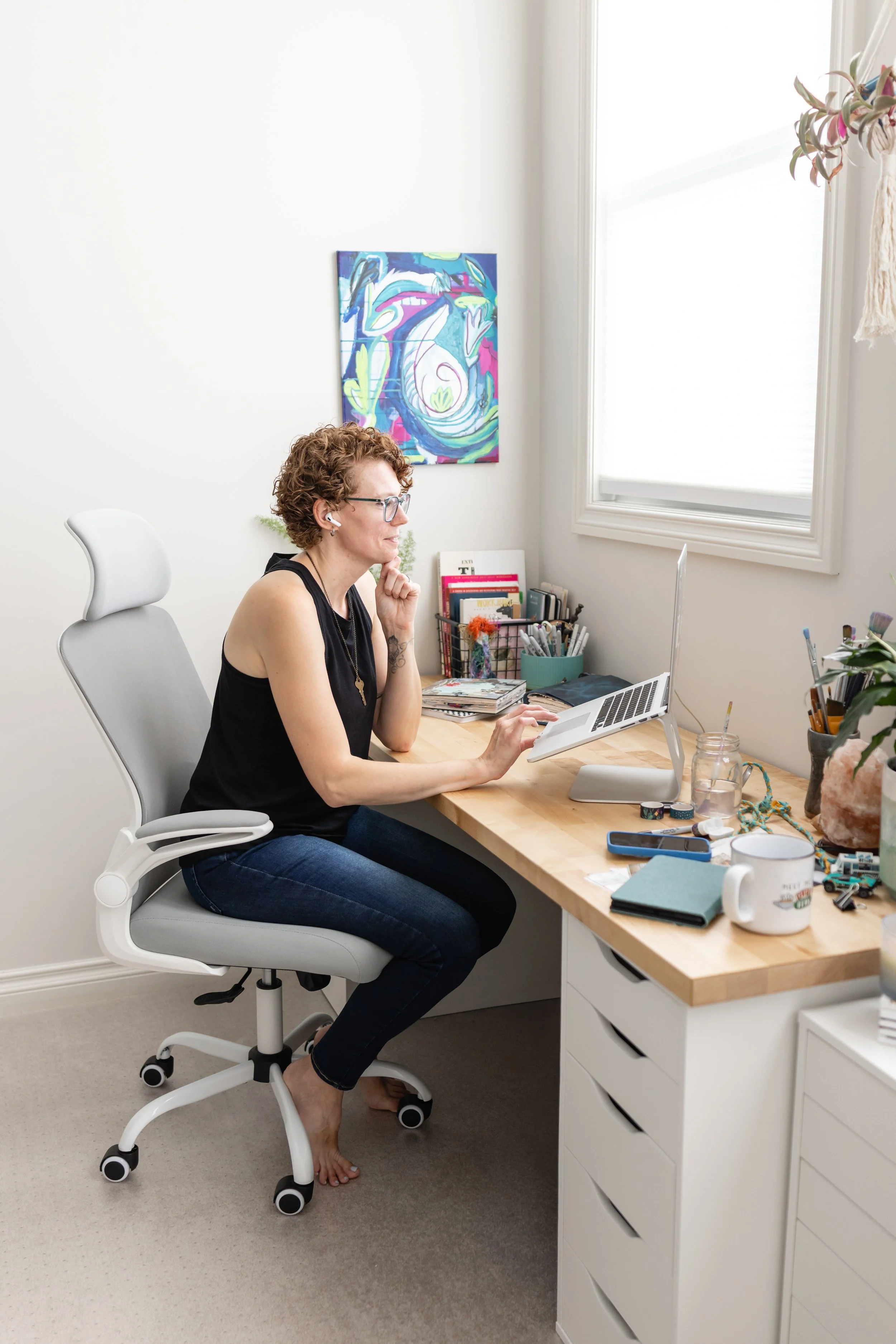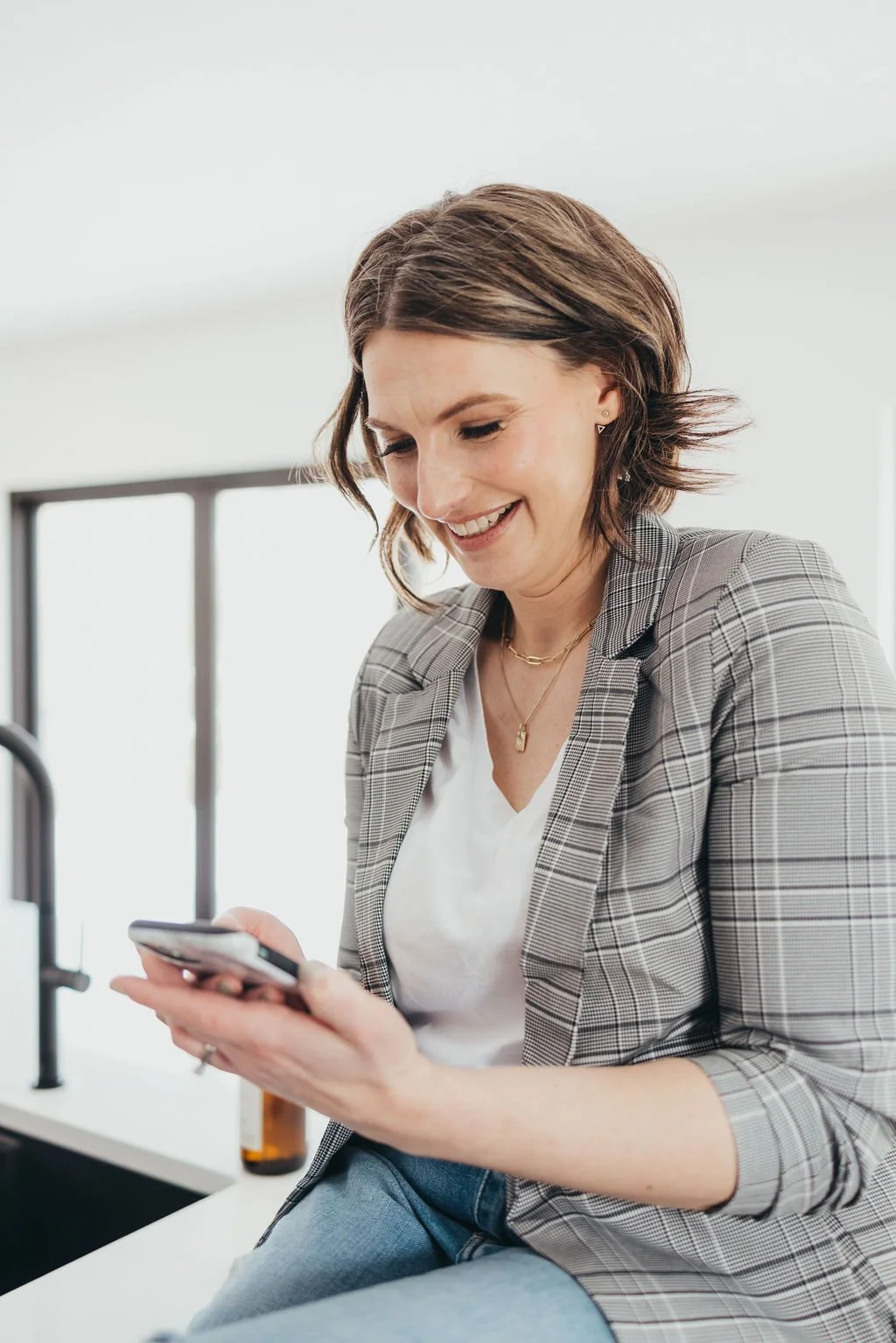78. Hope in ADHD Parenting: Early Interventions and Body-Based Support That Work
Three days into ADHD medication, my son came home from school and said something that stopped me in my tracks: "Mom, my brain was quiet today."
Not good. Not better behaved. Not more focused. Quiet.
Because here's what most people don't understand about ADHD: it's not actually an attention deficit. It's an inability to NOT pay attention to the thing that's most grabbing your attention right now. (Among other complicated things… but… that's for another blog post.)
ADHD medication doesn't make kids "good." It makes them feel good. There's a big difference.
A little note: Medication isn't the only option for ADHD support. There are lots. We are two parents who did choose that route and are seeing lots of benefits. If medication isn't for you or your family, that's okay - this episode might still have something for you.
I'm Kayla, a counselor and coach for moms. This week, I had the chance to reconnect with Jessica for our third conversation about ADHD parenting.
We first spoke about three years ago when she was working through her daughter's diagnosis, then caught up again a year later. Now, we can look back on those early days and see how much has changed.
But somewhere in the middle of our latest conversation, Jessica said something that absolutely gutted me: "If it wasn't for Kayla, I would probably still be struggling finding somebody that would help my daughter find medication."
I'm sitting here trying to write this without crying, because honestly? Her gratitude hit me sideways. Not because I did something extraordinary, but because it reminded me why these follow-up conversations matter so much. And if you're an ADHD parent feeling lost right now, Jessica's journey might just be the hope you didn't know you needed.
When we first met, things felt raw and new
Four years ago, Jessica and I met at a business mastermind event, where we established both a personal and professional connection. She reached out to me afterward, seeking support as she navigated her daughter's AuDHD diagnosis.
At that time, I was already working with and supporting mothers in similar situations, though my own experience with my son's ADHD diagnosis was still relatively recent. Jessica was one of the first individuals to whom I was able to offer my full range of resources. "We immediately clicked, and I'm so happy for that."
But here's what Jessica might not realize - her willingness to reach out, to seek information, to connect with someone who might understand? That took incredible courage. As a registered social worker and expressive arts therapist who works with overwhelmed mothers, I see this pattern over and over: the parents who find hope aren't the ones with perfect resources or easy-to-parent kids. They're the ones brave enough to admit they need support and then actually ask for it.
Early ADHD diagnosis: When you get choices instead of answers
Three years ago, diagnosis felt like a map that ended at a fork. We expected answers, and got choices: OT or speech, medication or movement, therapy or tutoring, new routines or new schools. The hardest part wasn't the label; it was the noise. Professionals, relatives, and well-meaning friends offered paths that sounded right yet contradicted each other.
What Jessica learned is simple and hard at once: there isn't one right route for neurodivergent families, but there is a right next step. "She's one of the first places I went to get information," Jessica said about finding ADHD parenting support with me, Kayla, early on.
When Jessica and I discussed the progress we've made over the past four years, she used a phrase that I still can't stop thinking about: "regulating and recalibrating and living life in this way."
Not "fixing" her daughter's AuDHD. Not waiting for her to become neurotypical. Not even hoping things would get "easier." Just... learning to live well within the reality of how her daughter's beautiful, complex brain actually works.
This shift - from fighting against ADHD to working with it - changes absolutely everything.
It changes how you show up to school meetings.
How you talk to your child about their brain.
How you see yourself as a parent.
How you measure progress and success and all the things we tell ourselves matter.
Here's what actually changed (and it wasn't the ADHD)
The thing about Jessica's story that moves me most isn't that her daughter's ADHD became easier to deal with. It's that Jessica learned to trust herself as the expert on her own child's experience.
Finding the right professional support for medication wasn't just about the medication itself. It was about validation. It was about having someone who understood what they were dealing with. It was about Jessica learning she could advocate effectively for her daughter and trust her instincts about what felt right for their family.
That confidence? That's the real transformation. Not the external symptoms or behaviors, but Jessica's growing certainty that she could navigate this journey and find the right support along the way.
Body-based ADHD interventions: The breakthrough she didn't expect
After years of talk-based therapy sessions, Jessica's daughter could recite coping skills but couldn't reach them when dysregulated. Moving to body-based ADHD support changed everything for both families. Deep pressure, weighted blankets, swinging, and scheduled vestibular input widened everyone's window of tolerance.
Chiropractic care, targeted at alignment and vagal tone, improved sleep and digestion within weeks, unlocking capacity for learning. They also screened primitive reflexes and practiced midline-crossing activities, which made occupational therapy gains stick.
None of this erased ADHD sensory sensitivity, but it offered exits from fight-or-flight without a power struggle. As the body calmed, access to words returned. As sensory regulation improved, independence followed: self-start mornings, sport participation, and self-directed coping without prompts.
Early ADHD intervention mattered more than they imagined, not as a magic fix but as scaffolding that reduced shame and built executive function skills before habits set in.
Research by Russell Barkley echoes what Jessica saw at home: when kids meet tailored supports before age twelve, they carry fewer invisible bruises into adolescence.
Family therapy for ADHD: Why it beats the "fix the kid" approach
The shift wasn't only Jessica's child learning coping skills; it was all of them learning a shared language for regulation and stress cycles. Family therapy helped siblings voice their load, sync expectations, and stop outsourcing their confidence to experts.
When they disagreed about timelines or ADHD treatment tools, therapy gave them a way to align without turning their kitchen into a nightly case conference. Alignment lowered friction, and lower friction freed energy for practice, rest, and joy.
ADHD progress isn't linear (and that's actually okay)
They expected a tidy curve and got sharp switchbacks. What kept Jessica steady was measuring change by function, not by "good days."
Could her daughter recover faster after a meltdown?
Could they hold a boundary without a meltdown?
Could team sports be ordinary more often? Those were their ADHD parenting metrics.
They also guarded community: parents who shared ADHD resources without shame, providers who adjusted course, and friends who didn't offer cures.
Hope in ADHD families landed as evidence, not as a mantra. Eighteen months without a sensory meltdown doesn't mean the work is over; puberty and new demands will bring fresh puzzles. But the foundation holds.
Why I keep having these conversations about ADHD
Having these follow-up chats with Jessica over the years isn't just nice - it's necessary. Because if you're in the overwhelming early days of ADHD diagnosis right now, you need to see that this story has an arc. That the panic and confusion and endless Google searches don't last forever.
You need to know that four years from now, you might be the one saying thank you to someone who helped you find your footing. You might be the one describing your family's life with ADHD not as a series of problems to solve, but as just... how you live.
As someone who works with mothers who are drowning in advice but starving for actual understanding, I know how isolating this journey can feel. You're probably wondering if you're the only one who can't figure this out, if everyone else got some manual you missed, if you're somehow failing at something other people make look effortless.
Jessica's story is proof that none of that is true. The confidence comes. The systems develop. The support network grows. And most importantly - you learn to trust yourself in this process.
Building sustainable hope in ADHD parenting
What I appreciate about Jessica is her realistic view that supporting neurodivergent children is ongoing work. "Regulating and recalibrating" suggests an active practice, not a problem that gets solved once.
Jessica Dunn (Regina, Saskatchewan) Guest on the Chill Like a Mother Podcast
Here's what I want you to know if you're reading this from the trenches of early diagnosis, school meetings, or medication trials: Jessica can now reflect on those early days without the panic that probably defined that time.
She can see the progress, the growth, the systems they've built as a family.
That perspective feels impossible when you're in the middle of it, I know.
But Jessica's story proves that time, support, and the willingness to keep learning really do create sustainable change.
Not perfect change. Not easy change. But real, meaningful progress that allows your family to thrive in your own beautiful, complex way.
The hope I want to offer you isn't false promises that everything will become simple. It's the real hope that comes from knowing this gets more manageable. You develop your toolkit. You find your people. You learn what works for your specific child and family.
And maybe, four years from now, you'll be the one having a conversation with someone just starting this journey, offering your own story of hope and transformation.
Because that's how this works - we show up for each other, we share what we've learned, and we remind each other that the love we have for our neurodivergent children really can move mountains. It just takes time to learn which mountains need moving and which ones are actually perfect exactly as they are.
P.S. Thank you, Jessica, for sharing your journey and for the reminder that hope in ADHD parenting isn't about perfection - it's about progress, connection, and the courage to keep learning together.


